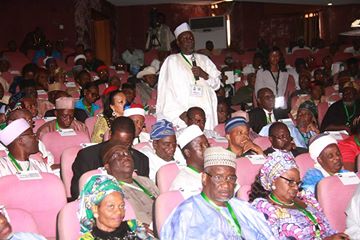 Many delegates at the ongoing national conference have thrown their weight behind the restructuring of Nigeria; devolve powers to the component units with a view to enthroning fiscal federalism in the country. They are also unanimous in demanding a return to regionalism based on the existing geo-political zones; which according to them, will speed up development by allowing each region to develop at its own pace.
Many delegates at the ongoing national conference have thrown their weight behind the restructuring of Nigeria; devolve powers to the component units with a view to enthroning fiscal federalism in the country. They are also unanimous in demanding a return to regionalism based on the existing geo-political zones; which according to them, will speed up development by allowing each region to develop at its own pace.
Prominent among advocates of restructuring were: the former Governor of Ogun State, Chief Segun Osoba; former People Democratic Party (PDP)’s National Publicity Secretary, Senator Anietie Okon; Prof. Akin Oyebode; Human Rights Lawyer, Chief Mike Ozekhome and Pro-democracy activist, Dr. Isaac Osuoka.
Chief Olusegun Osoba, a delegate representing former political office holders – former Governors, in his contribution, lamented that the present state structure was skewed in favour of a section of the country and advocated for a return to regionalism. He further expressed frustration at the disparity in the number of local councils in Lagos and Kano States, emphasizing that a return to the regions was apt so that each region could determine the number of local councils to create based on its financial muscles and peculiarities.
Senator Anietie Okon, a delegate representing Akwa Ibom State, urged fellow delegates not to dash hopes of Nigerians who were anxiously waiting for a change.
Another delegate, Chief Mike Ozekhome representing Federal Government in his opinion, described Mr. President Speech as a great one. He likened the President’s speech to that made by Martin Luther King Jr. of 1964.
Ozekhome spoke against religious bigotry and discrimination in the country, noting that much as Muslims and Christians must coexist under a country, Nigeria must return to fiscal federalism and devolve powers to the component units, if the country must make progress in the next century. He also urged the confab to subject its outcome to a popular referendum.
Prof. Akin Oyebode, a delegate representing Ekiti State described Nigerian federalism as “Caricature and feeding bottle federalism”, noting that the military killed federalism. More so, he described the 1999 Constitution that is in force today as Decree 24. Therefore, he opined that the only way out of Nigeria’s political logjam is a return to fiscal federalism and devolution of powers to the federating units, as the only panacea for development.
However, Dr. Tunji Braithwaite differed on the restructuring of the polity and averred that it must go beyond cosmetics and sloganeering. He said, Nigeria has to go the whole hog to enthrone a confederal system: a loose federation where the zones have some measures of autonomy to drive their own development.
According to Braithwaite, Nigeria has not been running a federal system of government since the encroachment of the military into politics in 1966.
He said, the military established a command structure-a unitary system of government which ultimately took away power from the people.
He noted that, “What this country is running now is not even federation. It is some kind of backward, ill defined federal system of government. To say we should have a true federalism now, I don’t know whether the circumstances and the make-up of Nigeria are suitable for federation. I don’t think so.”
“I will go further than just restructuring. I will go for reconfiguration of this country. They are telling lies to themselves when they say that we can be one indivisible nation. While one is not advocating secession, the people out there, the majority of the people in different zones would like to run their affairs in their own way, by their culture, by their own practices.”
“They do not object to having the same nationality just for the sake of belonging to a country but in terms of doing things together. I know that the people of Nigeria would prefer to do things their own way. In other words, they would prefer a loose federation or a confederation if you like …”
“For some of us who are over 80 years, this is a great sacrifice and for us to have made sacrifice, underscores the level of our commitment for the well-being of your generation. Loose federation will be most suitable in our situation.”
“We can increase the number of zones for instance, it is now six. We can increase not in excess but to about ten. You have clusters of ethnic nationalities for the zones. You can then free them to go their ways. Free them and wish that we would make the young, generation attain their potentials”, Braithwaite insists.
Report by Sampson Ikemitang
Support InfoStride News' Credible Journalism: Only credible journalism can guarantee a fair, accountable and transparent society, including democracy and government. It involves a lot of efforts and money. We need your support. Click here to Donate
